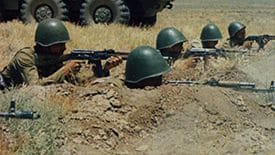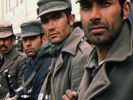Eye For Film >> Movies >> Afghanistan 1979: The War That Changed The World (2014) Film Review
Afghanistan 1979: The War That Changed The World
Reviewed by: Jennie Kermode

Mention the Afghan war today and people are likely to think you're talking about the recent unpleasantness with the Taliban, but there was another war, one that lasted a decade, which might be considered to have had a far more significant impact on the world. This film posits that without it, we wouldn't be anything like the mess we are today.
I'm talking, of course, about the Russian occupation of Afghanistan, which most people over 40 will probably remember though, in the West, they might not no very much about that. Director Gulya Mirzoeva makes that assumption and takes us through this subject from the very basics. This isn't ideal, because some viewers will feel patronised whilst complete newcomers to the subject will find much of the information packed in too swiftly to digest, but it is perhaps necessary. This is a neglected subject and it's important to have clear historical accounts.

Mirzoeva has acquired a great deal of strong interview material to support the lesson, most notably a very frank and melancholy contribution from Mikhail Gorbachev, who sees himself as having inherited the Brezhnev regime's mistake and not known how to get out of it. Lest we be tempted to go too easy on him, we are reminded that the final catastrophic decision happened on his watch, yet he makes a sympathetic figure and an impressively humble on, at this distance from his former position of power. Together with testimony from soldiers, his account provides an insider's perspective which has rarely been made available beyond the borders of the former soviet Union. It is balanced by archive clips of Ronald Reagan speaking about the conflict and pledging his support to representatives of the Mujahideen. The role of Osama Bin Laden, and the US help he gained, is touched upon, but this isn't about pointing fingers. The atmosphere of the film is something more like truth and reconciliation; the predominant mood is one of sadness, now, at how Afghanistan found itself at the centre of a proxy war.
Mirzoeva positions the incursion as pivotal in shifting geopolitics, over the years that followed, from a focus on the Americans versus the Soviets to a focus on Western culture versus Middle Eastern culture. It was certainly important in the rise of the Taliban. Archive footage hints at its destructiveness, at the loss of public buildings, homes and infrastructure, but there is perhaps too little of this to hammer home the point to an audience with limited awareness of what the country was like beforehand. Likewise, it would be nice to hear more Afghan voices in the interviews, though the widespread distress caused by the assassination of the country's elected leader and the arrival of foreign troops comes across clearly and should be easy for anyone who lives in a democracy to understand.
This isn't the most coherent of documentaries but it does include some fascinating material and manage a fair degree of balance in covering a subject where that is difficult to achieve. It also contains a frightening anecdote about coca cola that may leave you feeling nervous about your precious bodily fluids. Overall it's a bleak but undoubtedly useful film which highlights how little attention is now paid to a war that certainly changed a nation.
Reviewed on: 15 Nov 2015















